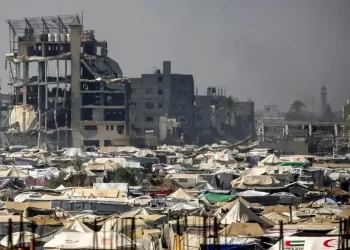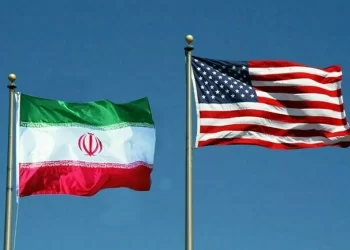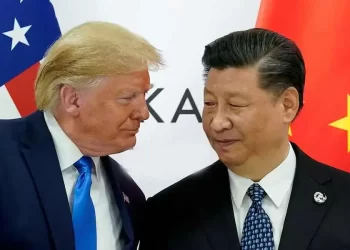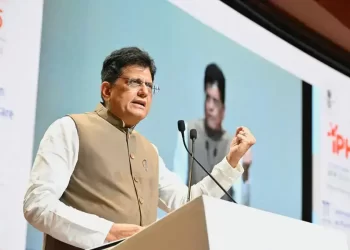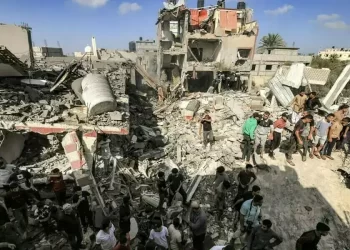JENIN, West Bank (news agencies) — In the web of battered, sun-baked streets winding up the hillside, bloodshed is as unrelenting as the heat. So it is not hard to see why, when raid sirens and gunfire erupted yet again on a morning in late May, 15-year-old Mahmoud Hamadneh turned his bike down an alley that held out the promise of refuge.
The narrow lane, a few hundred yards from his school, looks like an urban oasis, shaded by olive branches that reach across walls on either side. On a recent afternoon the cooing of doves and whine of cicadas amplified its stillness. Only the faded stain of Mahmoud’s blood in the pavement and a stone, hand-lettered with his name, betrayed the illusion.
“He didn’t do anything. He didn’t make a single mistake,” says Amjad Hamadneh, whose son, a buzz-cut devotee of computer games, was one of two teens killed that morning in the opening minutes of a raid by Israeli forces.
“If he’d been a freedom fighter or was carrying a weapon, I would not be so emotional,” says his father, an unemployed construction worker. “But he was taken just as easily as water going down your throat. He only had his books and a pencil case.”
Jenin’s refugee camp has long been notorious as a hotbed of Palestinian militancy, raided repeatedly by Israeli forces who have occupied the West Bank since seizing control in their 1967 war with neighboring Arab states. During the two-day raid that began the morning of May 21, Israeli troops traded fire with Palestinian gunmen. Militant groups said eight of the 12 Palestinians killed were their fighters.
But the casualties that day, and many others in recent months, went beyond armed men engaged in the region’s seemingly endless conflict. As the world’s attention focuses on the far more deadly war in Gaza less than 80 miles away, scores of Palestinian teens have been killed, shot and arrested in the West Bank, where the Israeli military has waged a months-long crackdown.
More than 150 teens and children 17 or younger have been killed in the embattled territory since Hamas’ brutal attack on communities in southern Israel set off the war last October. Most died in nearly daily raids by the Israeli army that Amnesty International says have used disproportionate and unlawful force.
Youths represent almost a quarter of the nearly 700 Palestinians slain in the West Bank since the war began, the most since the violent uprising known as the Second Intifada in the early 2000s. More than 20 Israeli civilians and soldiers have been killed in the territory since October.
At the same time, Israel, which has long jailed Palestinians from the West Bank without charge, has extended that practice to many more teens. After October, food deprivation, overcrowding of cells and other mistreatment escalated sharply, the recently released and advocates say.
It is clear from statements by the Israeli military, insurgents and families in the West Bank that a number of the Palestinian teens killed in recent months were members of militant groups.
Many others were killed during protests or when they or someone nearby threw rocks or home-made explosives at military vehicles. Still others appear to have been random targets. Taken together, the killings raise troubling questions about the devaluation of young lives in pursuit of security and autonomy.
Grief over those deaths has been shadowed by trepidation. Israeli raids won’t eliminate militant groups, survivors say. Instead, some fear, the pain of losing so many youths risks the opposite – pulling siblings, friends and classmates left behind into the region’s vortex of vengeance.
After Hamas killed 1,200 people in Israel last October and took 250 others hostage, long-smoldering tensions exploded.
Israel responded with a sweeping military campaign in Gaza that Palestinian authorities say has killed more than 40,000 people. That has fueled anger and insurgency in the West Bank, where Israeli forces police about 3 million Palestinians while assigned to protect 500,000 Jewish settlers.
The embattled territory was already seeing deadly clashes before the war began. But Israel’s military has significantly stepped up raids in the months since, characterized by Prime Minister Benjamin Netanyahu as part of the larger battle in Gaza and along the border with Lebanon to permanently disable militant groups that have long threatened his country’s security.
“I can assure you one thing: What has been is not what will be,” he told commanders during a June meeting in the West Bank. “We will change this reality.”
A military spokesman said the Israeli army makes great efforts to avoid harming civilians during raids and “does not target civilians, period.” He said human rights group focus on a few outlier cases.
Military operations in the West Bank are fraught because forces are pursuing militants, many in their teens, who often hide among the civilian population, said the spokesman, Lt. Col. Nadav Shoshani.
“In many cases many of them are 15, 16 years old who are not wearing uniforms and might surprise you with a gun, with a knife,” he said.
But critics say the crackdown is shaped by retribution, not only military strategy.


